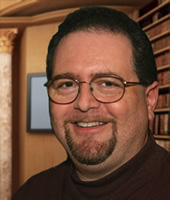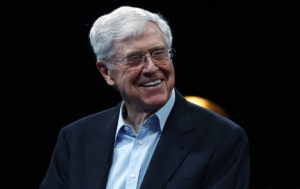A Critique of the New Religious Left
In the tradition of Sam Harris, Truthdig introduces secularist radio show host and author Barry Seidman, who argues in this essay that the new religious left could prove to be just as dangerous and divisive to the country as the religious right, because the admonitions of Abrahamic religious texts can never be reconciled with democracy.
Editor’s note: In the tradition of Sam Harris, Truthdig introduces secularist radio show host and author Barry Seidman, who argues in this essay that the new religious left could prove to be just as dangerous and divisive to the country as the religious right, because the admonitions of Abrahamic religious texts can never be reconciled with democracy.
After nearly 40 years of retreat, the American religious left is once again on the advance. And on the face of it, even secular Americans might have reason to cheer a religious movement focused on alleviating poverty, safeguarding the environment, improving criminal justice and opposition to war — as opposed to the religious right’s obsession with abortion and gay marriage.
As the movement’s most prominent leader, Jim Wallis, founder of the leftish Christian evangelical magazine Sojourners, put it in his 2004 book “God’s Politics: Why the Right Gets It Wrong and the Left Doesn’t Get It: A New Vision for Faith and Politics in America”: “Promoting and pursuing a progressive social agenda with a concern for economic security, health care, and educational opportunity [doesn’t] mean you [have] to put faith in God aside….” (1) [See footnotes.]
But however much praise Wallis and his followers deserve for joining the good fight against Christo-fascists like Jerry Falwell, Pat Robertson, Tim LaHaye and President Bush, the coupling of religion and politics is as dangerous for the left as it is for the right, because absolutism, authoritative supernaturalism and the actual tenets of the Abrahamic religious texts can never be reconciled with democracy and freedom.
Central to Wallis’ message is the belief that at the heart of Judaism, Christianity and Islam lays a golden and pristine platonic realm where the ethics of social justice, brotherly love and global peace drive God’s big-brained creation. Wallis points to Martin Luther King Jr. as an example of liberalism and spirituality joining hands to spark major progressive reforms. Wallis argues, “Martin Luther King Jr. … with his Bible in one hand and the Constitution in the other … reminded us all of God’s purposes for justice, for peace….” (2)
It is difficult to argue against what Dr. King accomplished, just as it can seem difficult to critique the religious right when its members (mis)talk about “family values.” But both arguments are misleading. As we shall see, when those on the right talk about values, they are actually promoting literal biblical dogma — dogma that includes diatribes against women, children, homosexuals, compassion and “the other.” (3) And even if King believed that his courage and strength derived from religion, when it came to actually doing what was necessary, he advocated for secular, humanistic change in our society … change that would never be made if he stuck to the Bible’s message.
What are the actual tenets of the Abrahamic religions, and can Wallis’ progressive vision be found there? In Hector Avalos’ new book, “Fighting Words: The Origin of Religious Violence” (2005), Avalos examines the Abrahamic religions with an eye toward explaining the kinds of behavior we associate with the Christian right in America, the Jewish right in Israel and the Islamic right in the Middle East. What he discovers will be sure to disturb anyone with a liberal impression of God.
Avalos’ main argument is that violence stems from real or perceived scarcities of resources. When we look at the Bush administration’s invasion of Iraq, we see the very real concern with the dwindling oil reserves on Earth, and how the oil-made members of the administration would risk personal economic disaster if Iraqi oil were to actually serve the Iraqi people. But in addition to real resources, “perceived resources” can also become the focus of violence — and all too often these resources have been created by our religious books.
According to Avalos, one of these perceived resources stems from what he calls “group privileging.” For example, the Jewish belief that Israel is the chosen land — and that Jews are a chosen people — necessarily elevates Jews in their own eyes above all other people on Earth. This perceived scarcity — the scarcity of being God’s “favorite” — can be seen in Israel’s current policy toward the Palestinians.
Avalos argues:
The type of Zionism that centers on Israel as the essential homeland for Jews rests on a religious belief in scriptural claims. In the absence of belief that God has given the land to the Hebrew people, the conflict may never have continued into the present. … Far from being mainly a political problem, modern Zionism represents the recrudescence of religious claims first enunciated in the Hebrew Bible. (5)
Avalos contends that the idea of group privileging also sparked religious violence by inculcating the idea among Jews that God helped them destroy other peoples — peoples the Jews saw as a threat, conveniently: the Hittites, Girgashites, Amorites Canaanites, Jebusites and the modern Palestinians.
(In an interesting aside, Avalos argues that “shalom” does not mean peace as is commonly misunderstood. Rather, “shalom” means repayment or retaliation. Avalos argues that “shalom” was a word meaning domination or hegemony of Jews over all, and severe retribution for any who go against the Jewish way of life.)
Many liberal-minded Christians, I have found, do not advocate for the angry, retributive God of the Hebrews. Jesus, they argue, revealed a new covenant that superceded the Old Testament. Thus the turning point from the Old to New Testament is then is where Wallis and other liberal religionists begin their arguments for the so-called “Prince of Peace.”
But Avalos finds plenty of perceived scarcities directly in the New Testament. One such scarcity is the idea of “sacred space.” In John 2:14-17 we find an account where Jesus whips people in a temple for selling animals and then goes on to wreck the place. Christian apologists have argued that this violence was justified because of blasphemy committed in a house of God. Avalos argues then that “since Jesus is a paradigm of Christian conduct, his actions came to influence some of the violence linked to sacred places we see in later Christian history.” (8) Avalos here is referring to the Crusades, among other historical Christian atrocities.
But Jesus did much more than this to ensure the cult-like following he would soon receive. Proclaiming himself the voice of God, he prepared the needy and fearful for future battles they were to endure while spreading Christianity. One such method is most probably the same sort used by Islamic fundamentalists when recruiting suicide terrorists. In Luke 14:26-27, Jesus says, “Whoever comes to me and does not hate father and mother, wife and children, brother and sister, yes, and even life itself, cannot be my disciple.” Mighty strong words no doubt meant to dedicate his followers to developing an artificial kinship with non-family members who would then fight as blood kin to the death for their perceived resource — God him/her/itself.
Even apart from his discussion of religious-created scarcities, Avalos uses a close reading of the Bible to reject the view that Christianity essentially espouses love and peace. He argues that in Romans 12:14 we do not really see an example of Christians loving their enemies at all, though this section is often cited by Christians for this very reason. The section begins, sure enough, “Bless those who persecute you; bless and do not curse them.” But what most liberal Christians then ignore is the rest of the section, “If your enemies are hungry, feed them; if they are thirsty, give them something to drink; for by doing this you will heap burning coals on their heads” (Romans 12:20). Heaping burning coals on their heads? Avalos suggests that read as a whole, the commandment to be nice is a way to build up the potential for violence against an enemy. The nicer one is to one’s enemies, the more they will deserve the violence done to them in the end.
Avalos understands Christian “love” this way:
Love was … primarily meant for other Christians. Those who believe in Christ will receive eternal love. Those who do not believe will receive an eternal torture in a fiery lake. “Love,” as a set of concepts described in the New Testament, is not really a response to violence in our world. Christians [argue for] unrelenting violence, from the punishment of individuals to the Crusades. … The definition of love is itself dependent on a scarce resource, namely access to God’s mind and divine communication. (10)
So even if the Religious Left has developed a healthier and somewhat more liberal understanding of human society based on compassion, interconnectedness, fairness, and justice, it is just as sure that they did not base these views on actual scripture. They merely attempt to make scripture fit their liberal beliefs, because the Bible is anything but liberal. I call this buffet religiosity–cherry-picking the parts of scripture that conform to their worldview, and discarding the ones that don’t. (How, exactly, one can justify cherry-picking the words of God, is beyond me.)
It is my argument, then, that the lure of religion (for both progressives and conservatives) lies in what the humanist philosopher, Dr. Paul Kurtz (12), has referred to as the “transcendental temptation.”
Simply put: The marvel of life, the fear of death, and the very real need for spiritual nourishment are perhaps the main reasons people give up or suspend reason for faith. They cannot see the beauty of life, of very existence, as something wonderful unto itself. They instead search for meaning in the universe when there can be meaning only within themselves. They try to eschew a depression rooted in the thought of their own mortality by clinging to thousand-year-old myths of everlasting life. They spend far too much time making believe there really is an afterlife, instead of living their one very real life in the here and now. As I often hear atheists say: This is the one life — here on Earth. This is not a dress rehearsal.
Liberal religionists have not been able to mature past the need for a “parent figure” lest they find themselves alone in the universe. Yet they do this while sometimes never enjoying their own relationships with other people — people with whom they share this life. We are indeed not alone.
I take for granted — but not lightly — that adherents of the religious right have a very unhealthy and quite primitive understanding of the universe, and a very narrow, narcissistic interpretation of their role in the human diaspora. And because of this, they have followed the ancient teachings found in Judaism, Christianity and Islam to a fault. Or perhaps, as Avalos might argue, they have this unhealthy and false worldview because they believe in their so-called holy books.
But members of both the religious right and left subscribe to the same ethics of hegemony and domination as did their ancestors who wrote their unscientific understanding of ethics on papyrus thousands of years ago. Both create just-so stories and impart their beliefs while nurturing insidious territorialism. The ancients did not have the scientific knowledge or the intellectual maturity necessary to live together with all of humanity in mutual respect, free of myths and separatist values. What is our excuse?
What we must understand is that while fundamentalists of every shade try to relive the golden years of religious violence here in the 21st century, it is imperative that we do not fail to expose their creation of false scarcities. There is no supernatural realm; there are no gods or angels. Never were. There is no “sacred” land, people or ideas. What there is we can find in the beauty of Earth’s deserts, polar caps, mountain ranges and seas — and inside each one of us. We can enjoy the diversity of life on this planet as the one species capable of contemplating what life actually is. (14) This is the crux of scientific humanism. The left would be making a severe mistake to indulge the “transcendental temptations” of our collective past, for the truly progressive society is the one which has finally put away its childhood toys and vices, and begun to evolve toward a planetary humanism.
Barry F. Seidman worked as a humanist/free-thought community leader and special events coordinator for the Council for Secular Humanism and the Center for Inquiry from 2000 to 2006. He has a BA in video and film production from Rutgers University and an MA in science journalism from New York University. Seidman has been published in Free Inquiry, Philosophy Now, The Skeptic UK, The New Humanist, the Daily Record of New Jersey, Biotechnology News, Oncology.com, The Sciences, EXIT and Skeptical Inquirer. He contributed a chapter for the book anthology “Opposing Viewpoints: Death and Dying” and is co-editor of the anthology “Toward a New Political Humanism.”
(1) http://www.sojo.net/index.cfm?action=about_us.display_staff&staff=wallis
(2) http://www.afscme.org/publications/public_employee/2005/pemj0514.htm
(3) Bear in mind, by the way, that those traditional conservative values have always been, and are still today, aligned with religious values even when concerning the atheist-right such as Leo Strauss, Joe Stalin, etc.
(4) http://www.visionarylead.org/E-Newsletter/Articles/gods_politics.htm
(5) Avalos, Hector: “Fighting Words: The Origin of Religious Violence.” Pages 130-131
(6) Ibid., Pages 169-170
(7) Ibid., Pages 164-166
(8) Ibid., Pages 180-181
(9) Ibid., Page 205
(10) Ibid., Page 230
(11) Perhaps the most obvious contradiction in the Bible is between the commandment Thou Shall Not Kill and the plentiful killing that takes place in both testaments (somehow excused by God).
(12) http://www.secularhumanism.org
(13) Kurtz, Paul: “The Transcendental Temptation: A Critique of Religion and the Paranormal” (Prometheus Books, 1991).
(14) As Carl Sagan understood, humanity is the universe’s first successful attempt to understand itself.
Your support matters…Independent journalism is under threat and overshadowed by heavily funded mainstream media.
You can help level the playing field. Become a member.
Your tax-deductible contribution keeps us digging beneath the headlines to give you thought-provoking, investigative reporting and analysis that unearths what's really happening- without compromise.
Give today to support our courageous, independent journalists.








You need to be a supporter to comment.
There are currently no responses to this article.
Be the first to respond.